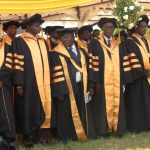Bachelor of Arts in Mass Communication (BA MC)
The Bachelor of Arts in Mass Communication (BAMC) programme generally aims at preparing students to work in Mass Communication or other related media fields. It will enable them work in dynamic environments regardless of the political, social or economic situations. Students will be equipped with skills necessary to deal with democratic and political communication processes, economic and social development domains, and most importantly to keep them abreast of evolving communication technologies and advertising techniques.
Programme Summary
Course Name: Bachelor of Arts in Mass Communication
Course Initials: BAMC
Duration: 3-6 Years
Total Units: At least 39
Mode of Delivery: Blended
Programme Informations
Option (I): Direct Entry Scheme (Form VI) Qualifications
Possession of Certificate of Secondary Education Examination (CSEE) or equivalent, with at least four passes in approved subjects, And He/she has obtained at least two principal passes with a total of 4.0 points in any subjects in the Advanced Certificate of Secondary Education Examination (ACSEE).
Option (II) Equivalent Qualifications
Any Diploma recognized by TCU with an average of ‘B’ or GPA of 3.0 with not less than four passes at ‘O’ Level
OR Certificate in Foundation Programme (ANY) offered by the Open University of Tanzania with at least GPA of 3.0.
OR Bachelor’s degree/Advanced Diploma from a recognised University/Institution
Level 1 (year 1)
Level 2 (year 2)
Level 3 (year 3)
|
a: General Fees for Bachelor Degree Programmes
b: Tuition Fees per Unit (or per 10 credits) for Bachelor Degree Programmes
| ||||||||||||||||||||||||||||||||||||||||||||||||||
|
Ms. Kahenga Dachi
Email: kahenga.dachi@out.ac.tz
Mobile: 0714019628
The Mass Communication programme is designed to prepare learners to acquire competences in mass communication research, communication planning, development communication, interplay between mass media and gender issues and reporting for various media outlets. Ultimately, the programme is expected to produce competent mass communication professionals who can produce outstanding media products, coordinate, plan, implement and evaluate communication efforts for maximum end results.
The distribution of marks for each course is 30% for Main Timed Test (MTT) and 70% for Annual Examination (AE). At the end of each academic year, a student failing a course or more than one course is allowed to take a supplementary examination in the failed subject(s). If the student fails again after doing supplementary examinations is given a chance to repeat the course. A pass in supplementary and repeat examination is recorded as ‘C’ whatever the marks scored by the candidate.



